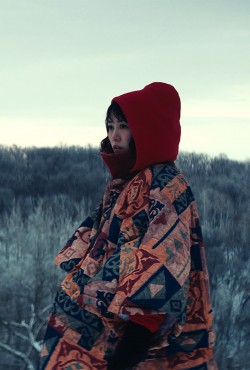Cinema | April 26th, 2015

The erroneous report that a Tokyo office worker died near Detroit Lakes, Minn., in 2001, looking for money buried in the snow in Joel and Ethan Coen’s “Fargo” forms the basis of David and Nathan Zellner’s haunting, original “Kumiko the Treasure Hunter.”
Starring Rinko Kikuchi as the title character, the Zellner brothers’ movie projects a heady metanarrative that is as much a consideration of our relationship to cinema as it is an elegy for its (presumably) doomed protagonist.
Stitching together the real and the imagined so seamlessly that the viewer experiences the same kind of disequilibrium fogging the thoughts and actions of the deeply depressed Kumiko, the filmmakers stage an engrossing prologue in Japan, where Kumiko endures the derision of her coworkers and the consternation of her boss, who cannot understand why Kumiko hasn’t gotten married.
A dreamy seaside sequence imagines Kumiko uncovering a VHS copy of “Fargo.” Kumiko’s response – an obsessive study of the section ending with Buscemi’s character marking the loot’s position with a red ice scraper – stands in sharp contrast to the heroine’s painful interactions with friends and family.
In fact, Kumiko’s most fulfilling alliance appears to be the one she enjoys with her pet rabbit Bunzo, and the Zellners wring plenty of pathos and no small measure of black comedy from Kumiko’s attempt to part ways with her furry companion.
Following her arrival in Minneapolis, Kumiko meets a series of Coen-worthy locals, including Shirley Venard’s “Shogun”-endorsing host and David Zellner’s beyond-the-call-of-duty police officer (brother Nathan also has a small part as an airport evangelist). The Americans encountered by Kumiko are unfailingly helpful and earnest, leading some viewers to detect a whiff of filmmaker condescension. Just as many, however, will see what Scott Foundas calls “a humanist touch that allows everyone to maintain an elemental dignity.”
Prior to “Kumiko,” which is curiously punctuated “Kumiko, the Treasure Hunter” on the poster and in press materials (no comma in the onscreen title), the Konishi story had been explored by Paul Berczeller in his 25-minute nonfiction essay film “This Is a True Story,” an equally somber and meditative document with an agenda that ultimately differs from the fictionalized feature.
Berczeller carefully unpacks the details that gave rise to the original misunderstanding, communicating directly with the Bismarck police officers whose interactions with Konishi would lead to the unfortunate Telegraph headline “Cult film sparked hunt for a fortune.”
“Kumiko” is evocative of a number of fish-out-of-water road movies, but the feature to which it bears the most striking resemblance is “Stroszek,” Werner Herzog’s classic 1977 fable. Even though Kumiko’s own chairlift ride pays direct homage to the indelible image of Bruno S. and his frozen turkey, the Zellners also follow Herzog’s lead in their exploration of both internal and external “stranger in a strange land” displacement, isolation and mental chaos.
The conclusion of “Kumiko” might be more hopeful than the fiery finale of “Stroszek,” but both movies end with moments that genuinely honor and respect the harrowing journeys of their brave adventurers.
February 23rd 2026
February 23rd 2026
February 16th 2026
February 16th 2026
February 9th 2026

__293px-wide.png)

_(1)__293px-wide.jpg)

_(1)_(1)_(1)_(1)_(1)__293px-wide.jpg)